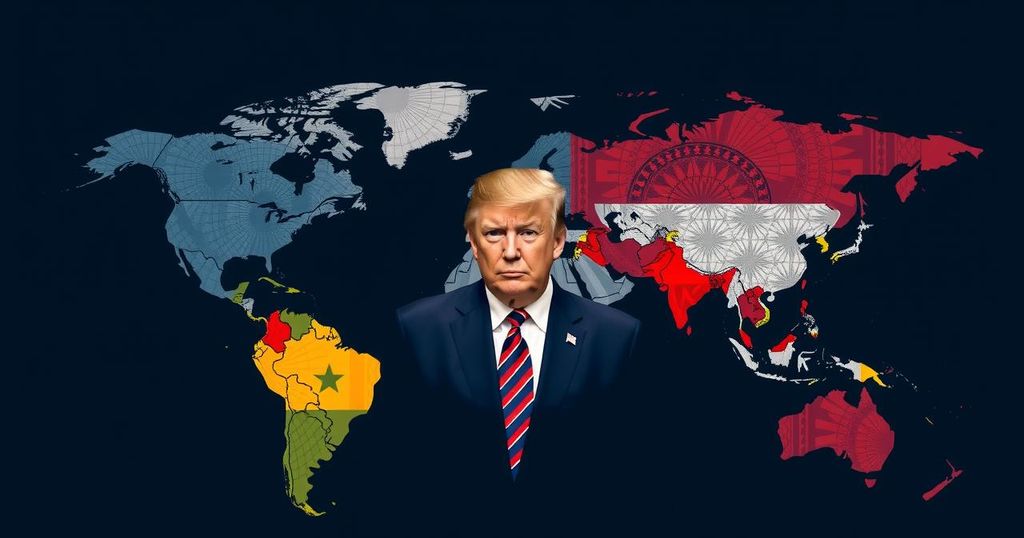Trump’s Return to Power: Implications for the Subcontinent

On November 5, 2024, Donald J. Trump was re-elected as President of the United States. Editorials from Pakistan, Bangladesh, Nepal, and Sri Lanka analyzed Trump’s victory, examining potential impacts on diplomatic relations, trade, and regional stability. Mixed reactions were evident: while somber reflections on U.S.-Pakistan ties surfaced, some optimism emerged from Bangladesh regarding bilateral cooperation. Nepal expressed concerns about democratic vulnerabilities, and Sri Lanka remarked on the broader implications of Trump’s presidency.
On November 5, 2024, former President Donald J. Trump secured his return to the White House, becoming the 47th President of the United States. His victory came on the heels of a tumultuous prior term marked by loss to Democrat Joe Biden in 2020. While much discourse has ensued regarding the implications of Trump’s presidency on regions such as the Middle East and the Russia-Ukraine conflict, less attention has been directed towards how this administration may influence the Subcontinent, encompassing Pakistan, Bangladesh, Nepal, and Sri Lanka. In Pakistan, the newspaper Dawn speculated on reasons behind Trump’s success, citing high inflation and perceived arrogance among Democrats. The editorial notes that voters reacted against Biden’s strong support for Israel, suggesting a desire to “punish Mr. Biden and Vice President Kamala Harris.” Despite Trump’s victory, Dawn expressed skepticism regarding improvements in Pakistan-U.S. relations, stating that past administrations have cultivated only lukewarm ties. The Daily Star from Bangladesh analyzed the electoral details, indicating that Trump had 295 votes while Harris garnered 226, hinting at potential shifts in congressional control. Concerns were raised about Trump’s previous remarks regarding violence against minorities in Bangladesh and how this may frame U.S. policy towards their nation, particularly through the lens of India. Optimism, however, was expressed by Chief Adviser Prof. Muhammad Yunus, who congratulated Trump and anticipated bilateral cooperation. In Nepal, The Kathmandu Post reflected on the voter’s decision to support Trump amidst his controversial image, asserting that economic concerns overshadowed issues like character flaws or policy proposals. The editorial cautioned against electing strongman leaders, warning of America’s struggles with democratic challenges under such leadership—citing Nepal’s vulnerabilities due to its own insufficient political frameworks. Sri Lanka’s The Island expressed its ambivalence, suggesting that the potential consequences of Trump’s second term could include implications for trade, immigration, and foreign policy. The editorial noted the irony in the local President’s congratulatory message to Trump, linking intense political unrest in both nations. Ultimately, The Island forecasted that Trump’s presidency might not present an overall deterioration compared to Biden’s tenure. Through these distinct perspectives, the press from the Subcontinent reveals a mix of skepticism, concern, and guarded optimism in response to Donald Trump’s historic return to power, highlighting intricate diplomatic relations and regional dynamics poised for potential shifts under his administration.
The article examines the implications of Donald J. Trump’s recent election as 47th President of the United States on the Subcontinent, particularly scrutinizing perspectives from the press in Pakistan, Bangladesh, Nepal, and Sri Lanka. Following a contentious previous term and a significant electoral win, Trump’s return invites analysis of regional political landscapes, economic forecasts, and potential shifts in bilateral relationships, considering his administration’s past actions and rhetoric. This backdrop informs the editorial viewpoints which reflect a blend of apprehension and anticipation regarding future relations and policy outcomes under Trump.
In conclusion, the return of Donald J. Trump to the presidency has generated varied reactions in the Subcontinent, reflecting a complex amalgam of optimism and skepticism. Editorials from Pakistan, Bangladesh, Nepal, and Sri Lanka highlight concerns over deteriorating diplomatic ties, the repercussions of U.S. policy decisions, and the potential implications for regional stability and welfare. As the international landscape shifts, these nations express a cautious outlook, hoping for favorable engagements while remaining wary of Trump’s impact on their respective political and economic spheres.
Original Source: indianexpress.com








